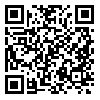Volume 12, Issue 60 (2024)
CFL 2024, 12(60): 77-110 |
Back to browse issues page
Download citation:
BibTeX | RIS | EndNote | Medlars | ProCite | Reference Manager | RefWorks
Send citation to:



BibTeX | RIS | EndNote | Medlars | ProCite | Reference Manager | RefWorks
Send citation to:
Pourabrisham E. Review and Analysis of Ordeals in the Works of Athar al-Bilad wa Akhbar al-'Ibad. CFL 2024; 12 (60) :77-110
URL: http://cfl.modares.ac.ir/article-11-76045-en.html
URL: http://cfl.modares.ac.ir/article-11-76045-en.html
Assistant Professor of Persian Language and Literature, Shahid Chamran University Of Ahvaz. Ahvaz. Iran , E.pourabrisham@scu.ac.ir
Abstract: (722 Views)
Ancient geographical texts contain valuable information in the field of folklore studies, as they often focus not only on the climatic conditions, but also on the way of life of the people. Athar al-Bilad wa Akhbar al-'Ibad by Zakariya ibn Muhammad al-Qazwini, a geographical text from the 7th century AH, is a work in which the author, relying on various sources, has tried to present a picture of the seven climates and the culture and beliefs of their people. Among the transmitted folk culture, the ordeals are noteworthy.
The author, who is himself a judge, has mentioned examples of ordeals, most of which are considered divine judgments, such as the belief in the purifying properties of hot and cold water (the ordeal by fire and water). Ordeals related to the purity of the origin/body (passing through a cave/crevice, a pure spring) and sacred places and objects, and the judges of the ordeals (the chain of justice and the staff of Solomon).
The present research has addressed the precedents of these cases in different cultures and nations on the one hand, and the continuity of the rituals in later times, trying to consider them as a universal theme and from this perspective, investigate the symbolic/mythological aspects among them.
The author, who is himself a judge, has mentioned examples of ordeals, most of which are considered divine judgments, such as the belief in the purifying properties of hot and cold water (the ordeal by fire and water). Ordeals related to the purity of the origin/body (passing through a cave/crevice, a pure spring) and sacred places and objects, and the judges of the ordeals (the chain of justice and the staff of Solomon).
The present research has addressed the precedents of these cases in different cultures and nations on the one hand, and the continuity of the rituals in later times, trying to consider them as a universal theme and from this perspective, investigate the symbolic/mythological aspects among them.
Keywords: Aatharul Bilad Wa Akhbarul Ibad, Folk Culture, Ordeal, Cultural Motifs., Ordeal by Fire and Water
Article Type: پژوهشی اصیل |
Subject:
Folklore
Received: 2024/07/11 | Accepted: 2024/10/17 | Published: 2024/12/30
Received: 2024/07/11 | Accepted: 2024/10/17 | Published: 2024/12/30
Send email to the article author
| Rights and permissions | |
 |
This work is licensed under a Creative Commons Attribution-NonCommercial 4.0 International License. |








